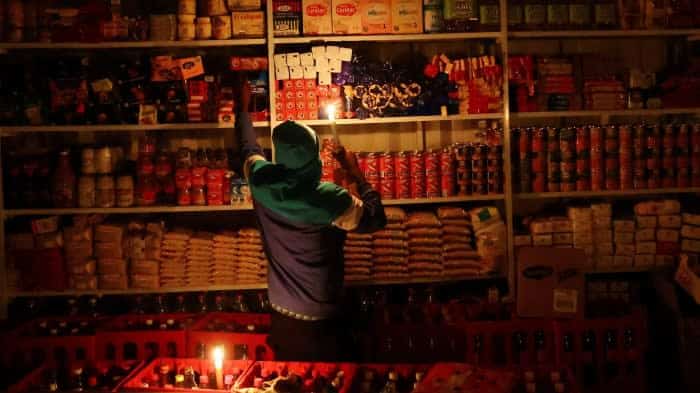The crisis at South Africa’s state-owned utility Eskom that has led to crippling electricity blackouts for most of the past decade has been “fixed”, according to the company’s chair.
“Structurally, we’ve changed the capacity of Eskom’s fleet of power stations,” Mteto Nyati told the Financial Times in an interview. The plan to turn around the company still had a year to run, but he said “the chances of having load shedding again are small”.
Load shedding, as the frequent blackouts are known in South Africa, has become a symbol of the economic mismanagement of the ruling African National Congress, costing the country almost R900mn for every day that the outages are at their worst.
But the comments from the head of its board — made just days before the most consequential elections since the first post-apartheid vote in 1994 — are likely to be met with scepticism among some Eskom customers who remain suspicious of the company’s ability to deliver.
The opposition Democratic Alliance has accused the ANC of “exerting pressure on Eskom to burn more diesel and keep the lights on at all costs” ahead of the May 29 poll in which the ruling party is forecast by most polls to lose its majority. Julius Malema, leader of the radical Economic Freedom Fighters, has said blackouts will return after the vote.
But Nyati, an engineer who was formerly chief executive of MTN South Africa, denies that the government was leaning on Eskom. “No politician has ever asked us to do something like this,” he said. “In February, we announced load shedding during the president’s state of the nation address, and people were pissed off, but we said we have to do what’s right for Eskom.”
Critics should wait and see what happened after the vote, he added, but then when there was “still no load shedding after the election, there’ll probably be another conspiracy theory, because people just don’t want to accept we’ve fixed Eskom”.
Eskom last weekend passed the psychological barrier of 50 days without imposing blackouts, but critics suspected this was done by spending billions of rand on diesel to fuel gas turbines and plug the electricity gap.
President Cyril Ramaphosa has called such talk a “political ploy” that was “not borne out by the facts”.
Eskom data shows that its spending on diesel has fallen sharply: it spent R53mn burning diesel from May 1-12, compared with R1,14bn in the same period last year. The state company’s energy availability factor, a crucial metric used to gauge how much electricity capacity can be deployed to the grid, has also risen, from 50.8 per cent last April, to 70 per cent on May 12.
Nyati said his board, which was constituted 18 months ago, had been able to achieve something its predecessors had failed to do in more than a decade predominantly by targeting underperforming coal-fired power stations.
“We had a coal fleet which hadn’t been maintained for a very long time, so it became unreliable. And the only way to fix that is to systematically go out to each power plant and fix the machines. And make sure the people doing that know what they’re doing.”
Almost three-quarters of the problems emanated from six of its 14 coal-fired plants, he added, so it had overhauled the management of those facilities and focused on them.
“The reason these stations weren’t being maintained is because of the lack of discipline, with people not following standard operating procedures. It looks basic, but it’s just that,” Nyati said.
James Mackay, chief executive of South Africa’s Energy Council, agreed with Nyati’s upbeat assessment, and expressed confidence that load shedding would end next year. “There’s no turning back . . . the maintenance recovery plan is working,” he said.
He added: “After more than 10 years of economic decline, it’s entirely justifiable to be sceptical. It’s taken time to see the benefits and a lot of challenges still remain, but the right things have been done.”
Frans Cronje, chair of the non-profit Social Research Foundation, said the departure of André de Ruyter, who quit as Eskom chief executive a year ago, had given the board the space to tackle the problem.
“De Ruyter’s exit allowed the cabinet to develop the good sense to support the coal station managers,” he said. The ANC was a pragmatic party that would adapt to survive, Cronje said, and as load shedding had become an election liability, the ANC eventually found a way to fix it.
De Ruyter said the fixes put in place while he ran the company were partly to thank for the easing of load shedding. “A lot of the maintenance initiated when I was there has now been completed. Those projects take 18 months to plan, and another year to carry out,” he said.
He also said the bigger challenge for Eskom was whether it could sustainably adapt to a future in which renewable energy was the dominant source. The question, he said, was whether “Eskom will spend money on expanding the grid, or on extending the life of old coal-fired power stations”.


